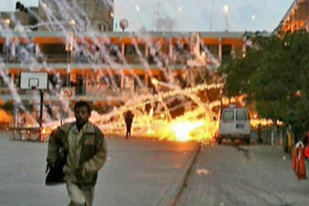
UN pictures show what appears to be white phosphorus 'wedges' raining down on one of its compounds in Gaza., a photo by Pan-African News Wire File Photos on Flickr.
Gaza Cease-Fire Agreed After 160 Rockets Fired From Enclave, MENA Reports
By Saud Abu Ramadan and Jonathan Ferziger on March 12, 2012
Israel and the Palestinians have agreed to a cease-fire in Gaza, after militants fired more than 160 rockets from the coastal enclave and Israeli air strikes killed at least 24 people, Egypt’s state-run news agency said.
The Middle East News Agency quoted an unnamed Egyptian official saying that the truce went into effect at 1 a.m. local time. Sirens warning of incoming rocket fire were heard in southern Israel after the cease-fire was supposed to take effect, the Israeli Ynet news website reported, citing eyewitness accounts. It didn’t report whether rockets had actually fallen.
Israeli Prime Minister Benjamin Netanyahu told parliament yesterday that the military “is ready to expand its operations and continue them as necessary.”
This month’s bloodshed began with a March 9 Israeli air strike on what the army said were two militants planning an attack from the Egyptian-controlled Sinai, including Zuhir al- Qaisi, head of the Popular Resistance Committees. The rocket attacks and air strikes that followed have been the worst since August, when eight Israelis were killed in an attack near the resort of Eilat and at least 24 Palestinians died in subsequent air raids.
In New York, U.S. Secretary of State Hillary Clinton joined other members of the so-called Mideast Quartet yesterday in expressing “serious concern” about the escalation. The group - - composed of the U.S., United Nations, Russia and the European Union -- called on Israel and the Palestinians to “refrain from provocative actions,” according to a statement following a meeting at the United Nations.
‘Limited Exchange’
“Israel is signaling that if you think you can escalate, we can escalate much more,” said Dan Schueftan, director of Haifa University’s National Security Studies Center. “It seems to be a limited exchange,” said Schueftan, who spoke before reports of a truce.
Israel’s short-term government bonds rose yesterday, pushing yields lower for the first time in eight days, as demand for the country’s safer assets increased amid violence in the south.
The yield on the 3.5 percent notes due September 2013 fell nine basis points, or 0.09 percentage point, to 2.63 percent, the lowest since Feb. 29. The TA-25 benchmark stock index dropped the most in almost one week, declining 1.1 percent.
Gaza health official Adham Abu Selmeya said seven people were killed yesterday and 45 people injured. Israel disputed its involvement in the death of one of those killed, saying its aircraft weren’t active in the area where it was reported. The air force targeted a number of militants, rocket-launching sites and weapons storage facilities, the army said in an e-mailed statement.
Islamic Jihad
Many of those killed in Gaza were members of Islamic Jihad, a small militant group supported by Iran and considered a terrorist organization by Israel, the U.S. and the European Union. Israel said it holds Hamas, which rules Gaza, responsible for all attacks emanating from the territory.
Four people have been wounded by about 160 rockets fired into Israel since March 9, Israel police spokesman Micky Rosenfeld said. Palestinian rockets also hit two vehicles delivering goods to Gaza at a border crossing point, Israeli officials said.
In 2008, Israel entered Gaza during a three-week operation in which at least 1,100 Palestinians and 12 Israelis were killed.
“Hamas doesn’t want to repeat what happened in the 2008 war, because it knows very well that another large-scale Israeli war on Gaza would damage its presence and it may lose power,” Mkhaimar Abusada, a political scientist at Al-Azhar University in Gaza City, said in a telephone interview. “Now Islamic Jihad leads the resistance and considers itself the pioneer armed wing.”
Schools Closed
Taher Nunu, a Hamas spokesman, said in an e-mailed statement on March 11 that his movement “is holding contacts with various parties, including our Egyptian brothers, to end the Israeli aggression upon our people.”
Schools in Israel’s southern towns and cities were ordered yesterday to stay closed for a second day, affecting some 250,000 students, Rosenfeld said. Israel decided to reopen its Kerem Shalom crossing to Gaza after shutting it briefly when it came under fire from three mortars from the Palestinian side of the border, according to Guy Inbar, a Defense Ministry spokesman.
“Islamic Jihad wants to be able to claim an achievement in hurting Israel, but we’ve managed to limit the damage and hurt them more,” said Ephraim Kam, deputy director of Tel Aviv University’s Institute for National Security Studies. “They aren’t big enough to sustain a long campaign by themselves.”
Netanyahu pledged to boost civilian defense with more Iron Dome anti-missile systems, which have shot down at least 44 rockets in the current round of violence, the army said.
Meanwhile, Egypt’s parliament yesterday demanded that the government expel Israel’s ambassador and recall Egypt’s envoy from Tel Aviv to protest against the attacks on Gaza, MENA reported. The assembly also called for an immediate end to natural gas exports to Israel, the Cairo-based news agency said.
To contact the reporters on this story: Saud Abu Ramadan in Jerusalem at sramadan@bloomberg.net; Jonathan Ferziger in Tel Aviv at jferziger@bloomberg.net
To contact the editor responsible for this story: Andrew J. Barden at barden@bloomberg.net
No comments:
Post a Comment